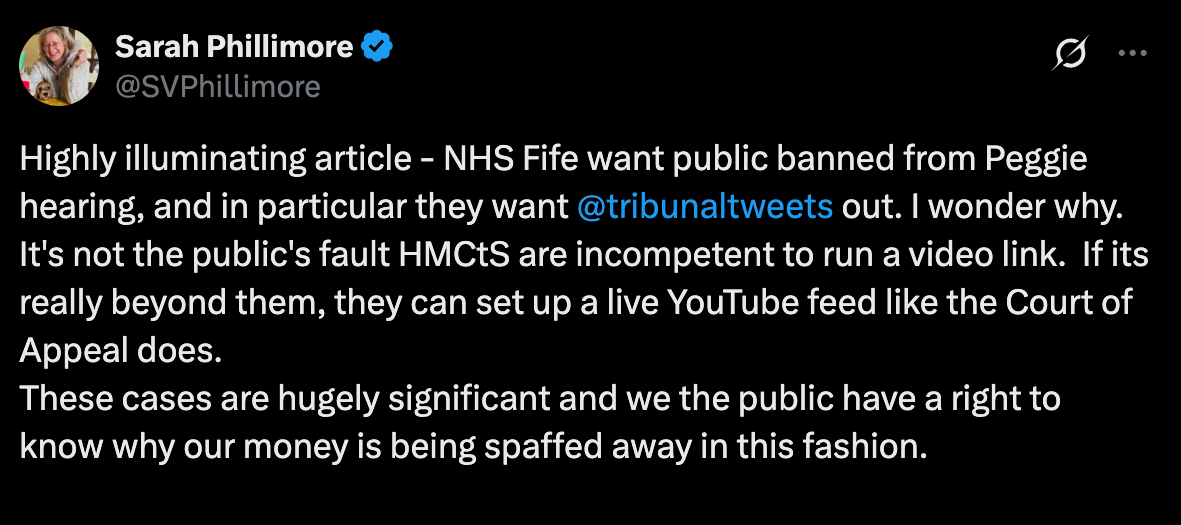The courage of Tribunal Tweets
In praise of a service that's changed the face of reporting sex and gender
NHS Fife wants to ban Tribunal Tweets from live tweeting its baffling attempts to defend - when the Sandie Peggie hearing resumes this summer - allowing men into women’s change and shower rooms. That’s on top of wanting to cut off the live stream to the public.
Naturally, it wants as few witnesses as possible to its humiliation. It must have been exquisitely embarrassing having hundreds of people logging on to watch your clinical staff struggle to explain the difference between men and women.
Of course we hope very much the court will decide, as it has before, that the principle of open justice must stand, and that these sensitive souls who care so little about the privacy of their female staff, and so much about their own, will simply have to brace up and face the cameras.
And we are particularly abraded by the application to ban Tribunal Tweets. It looks childish, even vindictive: while being a testament to the power of the citizen journalism service which has upended coverage of gender critical legal cases in the UK.
Because Tribunal Tweets doesn’t just shine a line-by-line light on what’s happening in proceedings. It’s also an exemplary comparator to the work of legacy media. Tribunal Tweets lifted the bar for all of them, and brought an awareness that not only could they be missing some excellent stories, but their readers now knew what they were leaving out and whether their coverage was slanted. And there will never come a time when any outlet can match the detail of Tribunal Tweets. Regular journalists will always be reporting after the fact, and will always have to leave something out. Tribunal Tweets brings you everything, as it happens.
NHS Fife’s application is an act of breathtaking chutzpah, and looks from the outside like an attempt to smear a reliably accurate, necessarily impartial, proto-professional, citizen journalism service.
The people who run Tribunal Tweets and who act as stenographers are all volunteers (some even pay their own expenses to travel to cases) and they’re supremely knowledgeable. They give up days to sit rigid, live stream on one device, X open on another, typing solidly for up to three hours at a time, knowing they have to get every reference to the law right, every question, every response, every name, every abbreviation, maintain an unbroken thread of hundreds of tweets, listening to one sentence while typing another, with dodgy sound and no time to ‘look it up’, no edits, no rewind and no going back to correct your work, with a clear understanding of contempt and the rules around court reporting.
Not just that - they have to maintain a spreadsheet of cases, staying across every tribunal and their associated reporting restrictions, run a roster of people who are already busy enough, and manage an up to date Open Justice Substack with full backgrounds of all cases and media coverage thereof. This resource has to be more accurate than any established media outlet. Why? Determination and mission from the volunteers, obviously.
But also because their permission to function lies in their reputation. Tribunal Tweets is uniquely vulnerable to vexatious complaint and attack by activists. They can’t fail to update, or miss out entire days and witnesses (like the BBC and Sky with Maya Forstater). They simply do not have the wiggle room that legacy outlets have.
All journalists know that live court reporting is extremely hard. No wonder Lawyer Magazine called Tribunal Tweets ‘a valuable service’, and no wonder so many reporters have come out in its defence. It is phenomenal.
And for those transactivists who accuse them of not being impartial - be assured, there is no time to put any kind of bias or filter between what is heard, and what is typed. Gender activists did actually try once to set up their own live-tweet service. They lasted less than a day.
This September will be Tribunal Tweets’ fifth birthday. Ironically they set themselves up because of fears that established outlets weren’t doing a good enough job. Helen Webberley’s Medical Practitioners’ Tribunal was coming up, and given what were then normal levels of media inertia over sex and gender coverage, a small team decided to do it themselves.
Since then they’ve covered around fifty cases, including Maya Forstater v CGD, Adams v Edinburgh Rape Crisis Centre, Jo Phoenix v Open University, Shahrar Ali v the Green Party, Denise Fahmy v Arts Council England, Allison Bailey, Mermaids v LGB Alliance, and of course For Women Scotland, the case that’s coming back at the Supreme Court next week.
It’s quite possible that the knowledge that the Sandie Peggie tribunal would be unflinchingly reported by TT helped lead BBC Scotland towards the most serious editorial advice it’s ever issued on a gender critical case, and specifically the instruction to use neither male nor female pronouns.
Tribunal Tweets has very, very rarely made mistakes, across tens of thousands of posts. How many X accounts - or reporters - can say that? But when it has, it is swift to correct, and to publicise the correction. And how many news outlets, we have to ask, can say that. Almost certainly - none at all.
When they started their work, the debate was small, X was owned by Jack and you were banned for calling trans-identified men men, media outlets would turn down pitch after pitch of gender critical stories, and the BBC was deep into its decade-long gender affirmative moment. Tribunal Tweets helped force coverage of these cases into the mainstream. It’s not an exaggeration to say - in terms of media awareness - they really did change everything.
And we don’t even know their names.
It would be shameful to prevent Tribunal Tweets live-posting the remainder of the Sandie Peggie case. We suspect that if a ban is imposed, we would see a ‘Spartacus’ moment where accredited journalists, who similarly respect the principle of open justice, would step in and flood the court with applications to do so.
This remarkable team needs to be allowed to quietly and stoically get on with its work. Deep respect to Tribunal Tweets. Leave them be.














Journalists fought hard for the right to live tweet from court. I remember how hard it is to make live notes in court ( I never mastered shorthand).
This small team have dedicated themselves to covering these cases. They do an amazing job.
When I first heard of them, I assumed they were an official court service!!
I've been trying to identify the feeling I have about Tribunal Tweets. It goes beyond admiration, and is probably pride. I am so proud of these remarkable women - and more so now you have described the behind-the-scenes work involved! Tribunal Tweets: setting the standard for journalists everywhere.